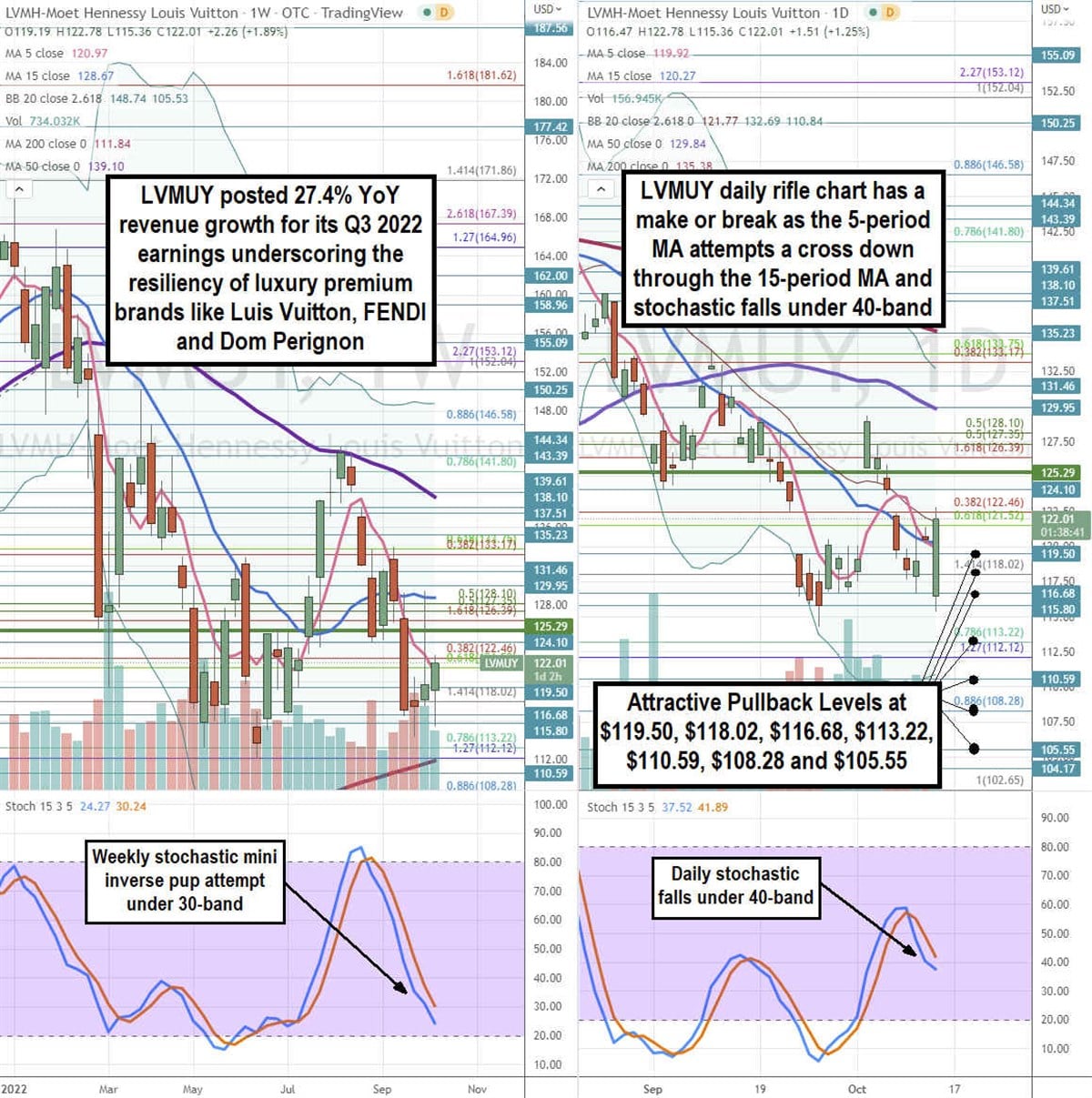LVMH's Diversified Luxury Brand Portfolio is Recession Armor What does Dom Perignon champagne, Louis Vuitton hand bags, FENDI purses, TAG Heuer watches, Tiffany & Co. jewelry, and Geurlain parfums have in common?
By Jea Yu
This story originally appeared on MarketBeat

What does Dom Perignon champagne, Louis Vuitton handbags, FENDI purses, TAG Heuer watches, Tiffany & Co. jewelry, and Geurlain parfums have in common? Yes, they are luxury brands, but they're also owned under one global luxury goods company LVMH-Moet Hennessy Louis Vuitton Société Europeenne (OTCMKTS: LVMUY). Paris, France-based LVMH sells low to high-end luxury brand products in five categories and over 60 major fashion brands known as houses. These categories include wines and spirits (26 houses), fashion and leather goods (14 houses), watches and jewelry (8 houses), perfumes and cosmetics (15 houses), and selective retailing (5 houses) including Sephora, DFS, and Starboard Cruise Services. The strong U.S. dollar is bolstering demand for its products in the U.S. and boosting margins for brands that are imported in U.S. dollars. While it receives nearly 40% of its revenues from the Asia-Pacific region including COVID restricted Chinese provinces, its performance has still been relatively strong despite inflationary headwinds. LVMH is a global luxury brand powerhouse that has both low and very high end brands. This enables it to protect itself during recessions as consumers tighten their purse strings and curb their spending from high end luxury brands to a notch or two lower.
Massive Luxury Brand Umbrella
The scale of diversification is what protects LVMH versus single brands like Ralph Lauren (NYSE: RL), or multiple brand players like PVH Corp (NYSE: PVH) which owns Tommy Hilfiger and Calvin Klein brands. Multi-brand companies like Tapestry (NYSE: TPR) which owns Coach, Kate Spade, and Stuart Weizmann or Capri Holdings (NASDAQ: CPRI) which owns Versace, Jimmy Choo, and Michael Kors provide little diversification and they just can't compare to the 60+ brands owned under the LVMH umbrella.
Luxury Tiers Provide Armor in Recessions
LVMH is a luxury retailer that spans multiple tiers of luxury brands. It's widely believed that a recession hurts upper to lower-middle-income consumers as they tighten their spending on discretionary items and luxury brands. Luxury items are best during strong economies. However, the diversity of LVMH brands ranging from low to high-end luxury enables it to still capture discretionary spending. For example, Dom Perignon champagne consumers may opt to tighten their wallets and downgrade to Veuve Clicquot champagne which often sells for half the price but maintains excellent quality. Luis Vuitton shoppers may downgrade to Mark Jacobs or Christian Dior. Either way, LVMH still gets the business due to its massive diversification and scale in the luxury products industry.

Here's What the Charts Say
Using the rifle charts on the weekly and daily time frames enables a precise view of the playing field for LVMUY stock. The weekly rifle chart made a bottom at the $112.12 Fibonacci (fib) level. Shares rallied through the weekly market structure low (MSL) buy trigger on a breakout through $125.29 as they peaked out on the weekly stochastic oscillation just above the 80-band as shares rejected off the falling weekly 50-period moving average (MA) resistance at $139.10. The weekly stochastic commenced its full oscillation back down towards the 20-band led by the weekly 5-period MA at $120.97 followed by the 15-period MA at $128.67. The weekly 200-period MA sits at the $112.12 fib. The daily rifle chart looked to breakdown, but a spike caused the daily 5-period MA to stall at $119.92 and 15-period MA to stall at $120.27. The daily stochastic is still falling but stalling at the 40-band to set up a daily make or break set-up. Attractive pullbacks levels sit at the $119.50, $118.02 fib, $116.68, $113.22 fib, $110.59, $108.28 fib, and the $105.55 fib level.
Rising Against the Tide
On Oct. 11, 2022, LVMH released its fiscal first-half 2022 results for the quarter ending June 2022. The Company reported revenue growth of 21% year-over-year (YoY) to 36.7 billion euros. Operating profits grew 34% YoY to 10.2 billion euros with 27.9% operating margins. Operating free cash flow fell (-24%) to 4 billion euros. Wine & Spirits revenues rose 23% to 3.327 billion euros and operating profits rose 23% to 1.154 billion euros led by the 16% volume spike in champagnes. Fashion & Leather Goods sales jumped 31% to 18.13 billion and operating profits rose 33% to 7,509 billion euros. Perfume & Cosmetics saw revenues spike 20% to 3.618 billion euros, but operating profits fell (-1%) to 388 million euros stemming from the COVID restrictions in China. The Watches & Jewelry segment saw a 22% jump in revenues to 4.91 billion euros and 26% jump in operating profits to $987 million euros. Selective Retailing saw a 30% gain in revenues to 6.63 billion euros, but operating profits spiked 181% to 367 million. The Sephora store-within-a-store Kohl's (NYSE: KSS) partnership added over 250 additional stores in the first-half of 2022. DFS brand performance was hurt by the health restrictions in China.
CFO Sums up LVMH Competitive Advantages
LVMH CFO, Jean-Jacques Guiony summed up their competitive advantages, "One, we enter the second half with a strong momentum, particularly demand momentum. Two, our geographic balance and diversification has proven to be a key asset over the last couple of years. Three, our financial strength provides an unparalleled ability to invest in marketing and selling strategies behind our brains. All this does not mean that we are immune to any external shocks, but it just means that we have the ability to face more adverse conditions and to emerge from them stronger than ever."









